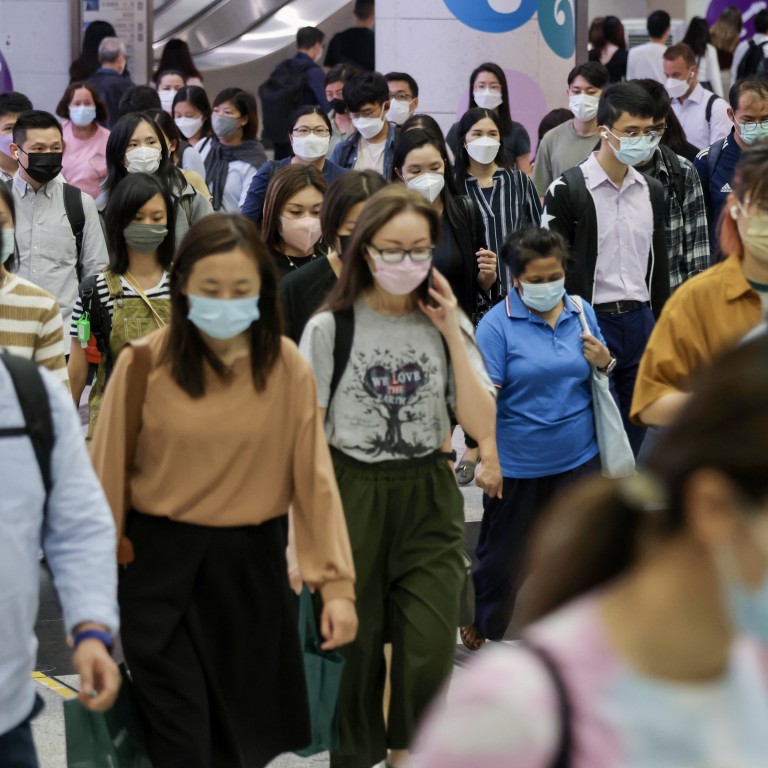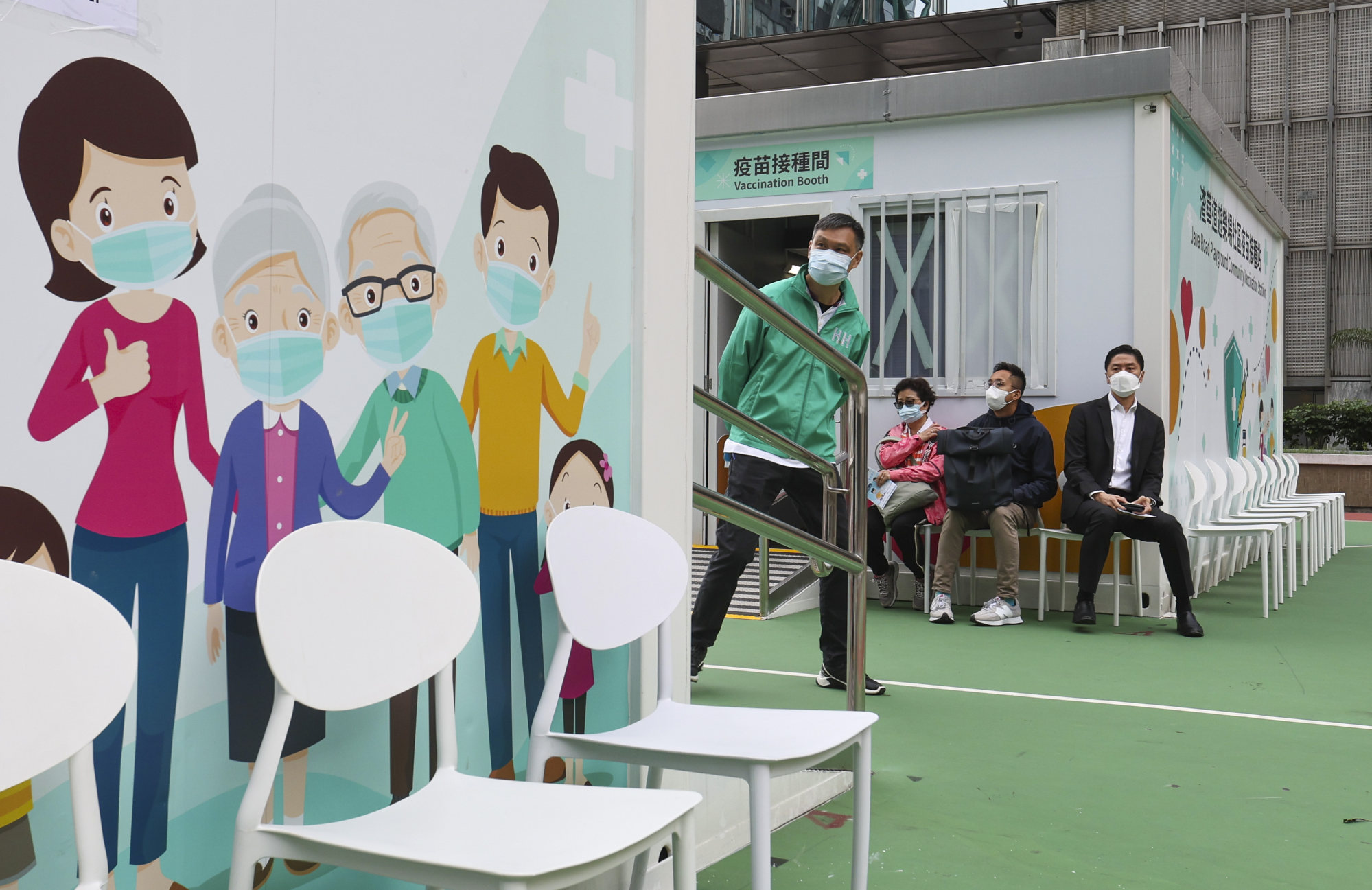
Coronavirus: Hong Kong’s daily Covid-19 numbers pass 10,000 mark for first time since September, death toll rises by more than 40 per cent in week
- Hospital Authority chief manager Dr Larry Lee warns of a potential double whammy of Covid-19 and influenza cases with the city experiencing cold weather
- City records 10,137 coronavirus infections on Thursday, the highest since September 10
Despite the city recording 10,137 coronavirus infections, the highest since September 10, Undersecretary for Health Libby Lee Ha-yun said authorities would not tighten or relax any pandemic curbs, but urged the public to look after children and the elderly.
“Judging from the trend, we have not seen a situation where [the caseloads] will decrease. Whether it will further increase, we will not be able to predict as Covid-19 is tricky, ever-changing and highly transmissive,” she told a media briefing.
“The pandemic situation is now on the rise. The government has been putting efforts in strengthening citizens’ immune barrier and we have a population group that we have to focus on protecting, which is the young and old.”

According to Lee, the public healthcare system currently had enough capacity to handle Covid-19 patients, but it had reached a point where the authorities must be “prudent and cautious”.
Thursday’s count included 606 imported cases, and 15 more deaths, bringing the total tally to 2,128,382 infections and 10,762 fatalities.
Authorities also noted a 47.4 per cent jump in the number of deaths in the past seven days compared with the week before, which they attributed to the rise in infections and delayed visits to doctors.
Government Covid-19 adviser Professor David Hui Shu-cheong said there was “nothing to fear” about the rise in infections given the city’s strong hybrid immunity.
“I’ve said many times that we should focus on the number of severe cases, ICU admissions and deaths,” he said. “Singapore had over 10,000 cases recently and now [they are] down to around 3,000.”
Hong Kong elderly first in line for second-generation BioNTech vaccine
The government should continue to boost the vaccination rate, especially that of high-risk groups, he said.
A five year-old boy, who had received one dose of a Covid-19 vaccine, was in a critical condition and was suffering from hydrocephalus after testing positive on November 28. He was admitted to the intensive care unit at Prince of Wales Hospital.
Another 22-month-old boy, unvaccinated and infected with Covid, suffered cardiac arrest on Thursday following a three-day fever and remained in critical condition after being sent to Queen Elizabeth Hospital.
The condition of a double-vaccinated girl, 12, with a chronic illness, was serious after she had been hospitalised on November 27. She has since stabilised.
Less than 30 per cent of children aged between three and 11 have received triple vaccine doses, while only 10 per cent of those younger than that bracket had been inoculated. Health authorities have urged parents to vaccinate their children to prevent serious symptoms and deaths resulting from infections.
Hospital Authority chief manager Dr Larry Lee Lap-yip also warned of a potential double whammy of Covid-19 and influenza cases with the city experiencing cold weather.
‘Hong Kong could face bigger flu outbreak this winter due to weakened immunity’
“According to overseas studies, patients who are infected with Covid-19 and influenza at the same time face higher risks of serious symptoms and deaths,” he said.
Lee urged residents to seek medical help as soon as they came down with the flu or Covid-19, especially the elderly, adding that people should get vaccinated to protect themselves.
More than 2,700 Covid-19 patients had been hospitalised, up from 2,500 from the week before, he said, with an average of around 340 people admitted daily.
The number of patients in serious or critical condition also rose to about 120, compared with more than 100 in the previous week.
He said the number of patients from homes for the elderly had also increased, with 18.6 per cent of patients in hospitals coming from these facilities, noting an “obvious increase” compared with 11 per cent in early November.

Lee confirmed the authority’s services were normal and stable. But he would not rule out adjustments if cases continued to climb.
The Centre for Health Protection’s Dr Albert Au Ka-wing noted infections at elderly homes remained at a high level, with 74 facilities affected in the past week involving 114 residents and 12 staff.
He added that viral contents from its testing of sewage water also showed a “rapid increase” from mid-November, especially in the past few days, and were approaching levels seen in the most serious stage of the fifth wave in March this year.
First Hong Kong primary school students return to full-day, in-person classes
Meanwhile, the BioNTech bivalent shots against Omicron subvariants BA.4 and BA.5 are now being offered as fourth doses at community vaccination centres, as well as at inoculation stations in hospitals, and designated general outpatient and private clinics.
The bivalent shot serves as an alternative to the German-made BioNTech and Chinese-produced Sinovac first-generation vaccines that are based on the original coronavirus strain.
Residents aged 50 or above, immunocompromised people aged over 12, and those who are older than 18 and have a higher risk of Covid-19 exposure are urged to get the shots.
Two government scientific committees reached an interim consensus on Thursday night to recommend that immunocompetent residents aged 18 years or above who had received at least two doses of Covid-19 vaccine could choose to take the bivalent shot for their next jab.
Those with four doses of Covid-19 vaccines for more than six months could also choose to receive an additional shot – the Sinovac type or either of the BioNTech vaccines – at least six months after their last jab or recovery.
The committees also said those in residential care homes who had received at least two shots could choose the bivalent vaccine for their next dose.
The government said as of Thursday afternoon, around 31,200 people had made an appointment for the vaccine. Around 591,000 residents have received their fourth shot.


